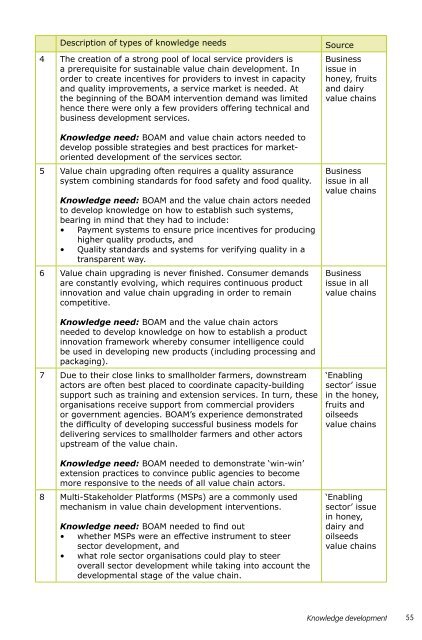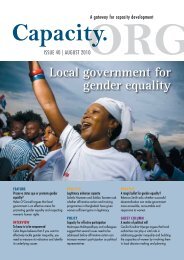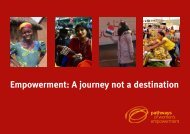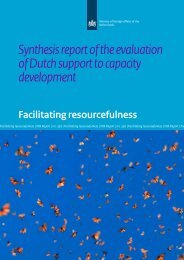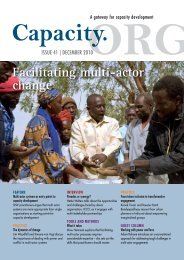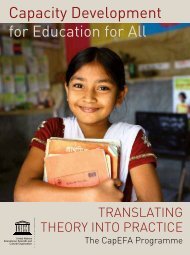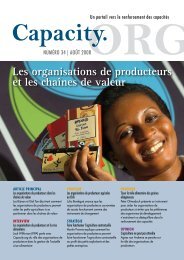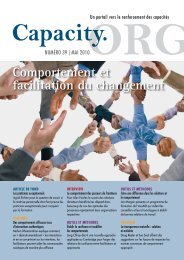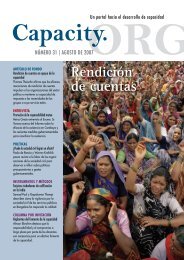Pro-Poor Value Chain Development - Capacity.org
Pro-Poor Value Chain Development - Capacity.org
Pro-Poor Value Chain Development - Capacity.org
Create successful ePaper yourself
Turn your PDF publications into a flip-book with our unique Google optimized e-Paper software.
Description of types of knowledge needs Source<br />
4 The creation of a strong pool of local service providers is<br />
a prerequisite for sustainable value chain development. In<br />
order to create incentives for providers to invest in capacity<br />
and quality improvements, a service market is needed. At<br />
the beginning of the BOAM intervention demand was limited<br />
hence there were only a few providers offering technical and<br />
business development services.<br />
Knowledge need: BOAM and value chain actors needed to<br />
develop possible strategies and best practices for marketoriented<br />
development of the services sector.<br />
5 <strong>Value</strong> chain upgrading often requires a quality assurance<br />
system combining standards for food safety and food quality.<br />
Knowledge need: BOAM and the value chain actors needed<br />
to develop knowledge on how to establish such systems,<br />
bearing in mind that they had to include:<br />
• Payment systems to ensure price incentives for producing<br />
higher quality products, and<br />
• Quality standards and systems for verifying quality in a<br />
transparent way.<br />
6 <strong>Value</strong> chain upgrading is never finished. Consumer demands<br />
are constantly evolving, which requires continuous product<br />
innovation and value chain upgrading in order to remain<br />
competitive.<br />
Knowledge need: BOAM and the value chain actors<br />
needed to develop knowledge on how to establish a product<br />
innovation framework whereby consumer intelligence could<br />
be used in developing new products (including processing and<br />
packaging).<br />
7 Due to their close links to smallholder farmers, downstream<br />
actors are often best placed to coordinate capacity-building<br />
support such as training and extension services. In turn, these<br />
<strong>org</strong>anisations receive support from commercial providers<br />
or government agencies. BOAM’s experience demonstrated<br />
the difficulty of developing successful business models for<br />
delivering services to smallholder farmers and other actors<br />
upstream of the value chain.<br />
Knowledge need: BOAM needed to demonstrate ‘win-win’<br />
extension practices to convince public agencies to become<br />
more responsive to the needs of all value chain actors.<br />
8 Multi-Stakeholder Platforms (MSPs) are a commonly used<br />
mechanism in value chain development interventions.<br />
Knowledge need: BOAM needed to find out<br />
• whether MSPs were an effective instrument to steer<br />
sector development, and<br />
• what role sector <strong>org</strong>anisations could play to steer<br />
overall sector development while taking into account the<br />
developmental stage of the value chain.<br />
Business<br />
issue in<br />
honey, fruits<br />
and dairy<br />
value chains<br />
Business<br />
issue in all<br />
value chains<br />
Business<br />
issue in all<br />
value chains<br />
‘Enabling<br />
sector’ issue<br />
in the honey,<br />
fruits and<br />
oilseeds<br />
value chains<br />
‘Enabling<br />
sector’ issue<br />
in honey,<br />
dairy and<br />
oilseeds<br />
value chains<br />
Knowledge development<br />
55


